Nikolai Patrushev

Nikolai Patrushev | |
|---|---|
Николай Патрушев | |
 Patrushev in 2023 | |
| Aide to the President of Russia | |
| Assumed office 14 May 2024 | |
| President | Vladimir Putin |
| Secretary of the Security Council of Russia | |
| In office 12 May 2008 – 12 May 2024 | |
| Chairman | Vladimir Putin Dmitry Medvedev |
| Preceded by | Igor Ivanov Valentin Sobolev (acting) |
| Succeeded by | Sergei Shoigu |
| Director of the Federal Security Service | |
| In office 9 August 1999 – 12 May 2008 | |
| President | Boris Yeltsin Vladimir Putin |
| Preceded by | Vladimir Putin |
| Succeeded by | Alexander Bortnikov |
| Personal details | |
| Born | 11 July 1951 Leningrad, Russian SFSR, Soviet Union |
| Children | 2, including Dmitry |
| Education | Leningrad Shipbuilding Institute |
| Awards | Hero of the Russian Federation |
| Military service | |
| Allegiance | Russia Soviet Union |
| Branch/service | Federal Security Service |
| Years of service | 1975–2008 |
| Rank | General of the Army |
Nikolai Platonovich Patrushev (Russian: Никола́й Плато́нович Па́трушев; born 11 July 1951) is a Russian politician, security officer and former intelligence officer who served as the secretary of the Security Council of Russia from 2008 to 2024. He previously served as the director of the Federal Security Service (FSB) from 1999 to 2008. Belonging to the siloviki faction of president Vladimir Putin's inner circle,[1] Patrushev is believed to be one of the closest advisors to Putin and a leading figure behind Russia's national security affairs.[2] He played a key role in the decisions to seize and then annex Crimea in 2014 and to invade Ukraine in 2022.[3]
Early life and education
[edit]Born on 11 July 1951 in Leningrad, Soviet Union (now Saint Petersburg, Russia), Patrushev is the son of a Soviet Navy officer who was also a member of the Communist Party of the Soviet Union.[4]
Patrushev studied at secondary school No. 211 in the same class with the future chairman of the Supreme Council of the United Russia party, Boris Gryzlov.[5][6] Patrushev graduated from Leningrad Shipbuilding Institute in 1974, and initially he worked as an engineer in the Institute's shipbuilding design bureau, but very soon afterwards, in 1975, he was recruited by the KGB.[7]
He attended intelligence and security courses at the KGB School in Minsk, and later at the Higher School of the KGB in Moscow (the present-day FSB Academy).[4]
Patrushev has known Vladimir Putin since the 1970s, when the two men worked together in the Leningrad KGB.[8]
Career
[edit]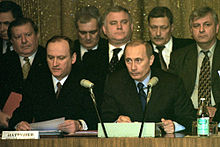
KGB security officer (1975–1991)
[edit]Starting as a KGB security officer in the city of Leningrad, Patrushev eventually rose to become head of their local anti-smuggling and anti-corruption unit.[9]
FSK and FSB career (1992–1999)
[edit]After the collapse of the Soviet Union, Patrushev continued to work in the security services and from 1992 to 1994 he was Minister of Security of the Republic of Karelia while in 1994 he was brought to Moscow as head of the Directorate of Internal Security of the Federal Counterintelligence Service (FSK).
In June 1995, Patrushev became deputy chief of the FSB's Organization and Inspection Department. From May to August 1998, he was chief of the Control Directorate of the Presidential Staff; from August to October, he was Deputy Chief of the Presidential Staff; in October 1998, he was appointed deputy director of the FSB and chief of the directorate for Economic Security. In April 1999, he became FSB First Deputy Director.
Director of FSB (1999–2008)
[edit]On 9 August 1999, a decree by President Boris Yeltsin promoted him to director, replacing his close friend Vladimir Putin.
In September 1999, a series of explosions hit four apartment blocks in three Russian cities, killing more than 300. The bombings, together with the Invasion of Dagestan, triggered the Second Chechen War. The handling of the crisis by Vladimir Putin, who was prime minister at the time, boosted his popularity greatly and helped him attain the presidency within a few months.[10] A suspicious device resembling those used in the bombings was found and defused in an apartment block in the Russian city of Ryazan on 22 September 1999.[11] On 23 September, Vladimir Putin praised the vigilance of the inhabitants of Ryazan and ordered the air bombing of Grozny, which marked the beginning of the Second Chechen War.[12] Three FSB agents who had planted the devices at Ryazan were arrested by the local police.[13] The next day, Patrushev announced that the incident in Ryazan had been an anti-terror drill and the device found there contained only sugar, and freed the FSB agents involved.[14] FSB also issued a public apology about the incident.[15]
Although the bombings were widely blamed on Chechen rebels, their guilt was never conclusively proven. A number of historians and investigative journalists have instead called the bombings a false flag attack perpetrated by the FSB to win public support for a new war in Chechnya and to boost the popularity of Vladimir Putin, the former head of the FSB, prior to the upcoming presidential elections.[16]
Former FSB agent Alexander Litvinenko, who blamed the FSB for the bombings and was a critic of Putin, was assassinated in London in 2006. The United Kingdom public inquiry into the poisoning of Litvinenko found that "the FSB operation to kill Mr Litvinenko was probably approved by Mr Patrushev and also by President Putin."[17]
Security Council of Russia (2008–2024)
[edit]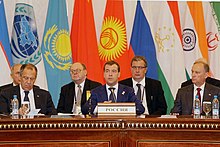
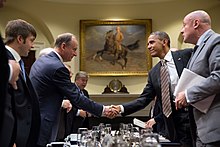
From May 2008 until May 2024, Patrushev had been Secretary of the Security Council of Russia, a consultative body of the president that works out his decisions on national security affairs.[18][19]
Patrushev considers the 2014 Revolution of Dignity in Ukraine to have been started by the United States.[20]
Patrushev believes that the United States "would much prefer that Russia did not exist at all."[20]
Following the October 2016 coup d'état plot failure in Montenegro, Patrushev was cited by experts, such as Mark Galeotti, as the Kremlin's point man for the Balkans, which was interpreted as indicating Russia's increasingly hardline approach to the region as well as the latter's growing importance in Russia's foreign policy strategy.[21][22][23]

According to Anastasia Vashukevich, Patrushev, who had traveled to Thailand during late February 2018, was involved in her arrest in Thailand during late February 2018.[24] Vashukevich claimed to have evidence linking Russian billionaire Oleg Deripaska and Deputy Prime Minister Sergei Prikhodko to Russian interference in the 2016 U.S. presidential election.[25][26]
In June 2019, Patrushev said that Iran "has always been and remains our ally and partner".[27]

In January 2021, he said that "the West needs" Russian opposition politician Alexei Navalny "to destabilise the situation in Russia, for social upheaval, strikes and new Maidans."[28]
Patrushev was a leading figure behind Russia's updated national security strategy, published in May 2021. It states that Russia may use "forceful methods" to "thwart or avert unfriendly actions that threaten the sovereignty and territorial integrity of the Russian Federation."[29][30]
On 19 September 2022, during his visit to China, he described the "strengthening of comprehensive partnership and strategic cooperation with Beijing as an unconditional priority of Russia's foreign policy."[31] He said that both China and Russia are calling for "a more just world order".[32]
On 18 November 2022, he arrived in Tehran and met with Iranian president Ebrahim Raisi and top security official Ali Shamkhani.[33] On 21 November 2022, he invited Vietnamese Minister of Public Security Tô Lâm to Moscow to strengthen security cooperation between Russia and Vietnam.[34] On 31 January 2023, he met Egypt's Foreign Minister Sameh Shoukry in Moscow.[35]
In February 2023, he hosted CCP Politburo member Wang Yi in Moscow and prepared the ground for the visit of CCP General Secretary Xi Jinping to Russia in March 2023.[3] Patrushev said that "amid a campaign by the West to deter both Russia and China, it is particularly important to further deepen the Russian-Chinese coordination and cooperation in the international arena."[36]
In February and March 2023, he visited Algeria, Venezuela and Cuba.[37] On 29 March 2023, Patrushev arrived in New Delhi and met with Indian prime minister Narendra Modi.[38] In September 2023, he expressed support for China's policies regarding Hong Kong, Xinjiang and Taiwan.[39] In February 2024, he met with the leaders of Nicaragua, Bolivia, Cuba and Venezuela.[40]
Patrushev is considered as very hawkish towards the West and the United States, and in 2022 was seen by some observers as one of the likeliest candidates for succeeding Putin.[41][42][43][44]
2022 invasion of Ukraine
[edit]In August 2021, during the withdrawal of US troops from Afghanistan, Patrushev told Izvestia newspaper that the United States had abandoned its Afghan allies, and that the reason was the incompetent work of the intelligence services of the United States, Britain and other NATO countries and the misplaced belief of the West in the correctness of its decisions. He predicted that the United States would also abandon its allies in Ukraine:
"...Kyiv is obsequiously serving the interests of its overseas patrons, striving to get into NATO. But was the ousted pro-American regime in Kabul saved by the fact that Afghanistan had the status of a principal U.S. ally outside NATO? (No). A similar situation awaits supporters of the American choice in Ukraine."[45]
In early November 2021, CIA Director William Burns and U.S. ambassador to Russia John Sullivan met in Moscow with Patrushev and informed him that they knew about Russia's invasion plans.[46] Burns warned that if Putin proceeded down this path, the West would respond with severe consequences for Russia. Sullivan recounted that Patrushev was undeterred and "supremely confident" that the invasion was going to succeed.[47] However, in late January 2022, just before the invasion, Patrushev publicly denied that Russia was prepared to attack Ukraine.[48][49]

Sources say Putin's decision to invade Ukraine was influenced by a small group of war hawks around him,[50] including Patrushev and Russia's defence minister Sergei Shoigu.[51] According to Putin-regime expert Catherine Belton, it was "Patrushev who's always been the leading ideologue of using capitalism as a tool to undermine the West to buy off and corrupt officials and so on. And he's certainly very much painted the West as a hostile enemy of Russia and something which is kind of debauched and decrepit, and it's time to attack [Ukraine in 2022]."[52] According to sources close to the Kremlin, most of Putin's close advisers opposed the invasion, and even Patrushev advised Putin to give diplomacy another chance three days before the invasion, but Putin overruled them all.[53]
On 26 April 2022, after two months of war, Patrushev predicted that Ukraine would collapse and be broken into several states because of what he cast as a U.S. attempt to use Kyiv to undermine Russia. He repeated the "denazification" trope and claimed:
"Using their henchmen in Kyiv, the Americans, in an attempt to suppress Russia, decided to create an antipode of our country, cynically choosing Ukraine for this, trying to divide essentially a single people. The result of the policy of the West and the regime in Kyiv can only be the disintegration of Ukraine into several states."[54]
Patrushev claimed that "Ukraine, saturated with weapons, poses a threat to Russia".[55] He downplayed the sanctions against Russia and said that "Russia is reorienting itself away from the European market to the African, Asian and Latin American markets."[55]
In April 2022, he addressed the global food crisis, caused in part by Russia's invasion of Ukraine, saying that "Tens of millions of people in Africa or the Middle East, through the fault of the West, will be on the verge of starvation. To survive, they will rush to Europe. I'm not sure that Europe will survive the crisis."[55]

In May 2022, he speculated that Poland "is already taking actions related to the seizure of western Ukrainian territories."[55] He claimed that the West "has already revived the shadow market for the purchase of human organs from the socially vulnerable segments of the Ukrainian population for clandestine transplant operations for European patients."[56]
On 17 August 2022, Patrushev met with Narendra Modi's National Security Advisor Ajit Doval to discuss measures to strengthen the strategic partnership across sectors including defense ties and energy security. Russia appreciated India's neutral position on Ukraine.[57]
In October 2022, Patrushev accused the United States and its allies of wanting to "fight to the last Ukrainian".[55] He said that Anglo-Saxons "are exploiting Ukraine as an instrument of struggle with our country ... The goal is to suppress Russia, retain their imaginary supremacy, keep their unipolar world, ensure themselves the opportunity to live at the expense of others.[55]
In November 2022, Patrushev accused the West of inciting Ukraine to attacks on the Zaporizhzhia Nuclear Power Plant and of assisting in the production of a "dirty bomb". He also accused the United States of wanting to recruit terrorists from Afghanistan and use them in the fight against Russia in Ukraine. He claimed that the West wants to destabilize the world to maintain its global dominance, saying that the "reckless policy of Washington, London, and their allies resulted in bloody adventures in the Balkans, Iraq, Libya, Syria, Afghanistan and Ukraine, which have already claimed the lives of hundreds of thousands of people."[58]
In January 2023, he claimed that Russia was fighting NATO in Ukraine and that the West was trying to destroy Russia.[59]
In February 2023, during a meeting with CCP Politburo member Wang Yi in Moscow, Patrushev claimed that "the bloody events in Ukraine staged by the West" are just one example of the West's attempts to maintain its global dominance.[36]
In May 2023, Patrushev blamed the United States and Ukraine for the number of attacks in western Russia and said that "the terrorist attacks committed in Russia are accompanied by an information campaign prepared in advance in Washington and London, designed to destabilise the socio-political situation, and to undermine the constitutional foundations and sovereignty of Russia."[60]
On 15 September 2023, Patrushev claimed that Russia had identified and "neutralized" hundreds of foreign spies in recent years.[61]
In September 2023, he met the Chinese foreign minister in Moscow for the annual security talks.[62] On 10 October 2023, he arrived in Baku, Azerbaijan, where he met with Azerbaijani President Ilham Aliyev.[63]
On 22 December 2023, The Wall Street Journal cited sources within the Western and Russian intelligence agencies as saying that the Wagner Group plane crash was orchestrated by Patrushev.[64] The paper alleged that Patrushev presented to Putin a plan to assassinate Yevgeny Prigozhin in August 2023, which led to intelligence officials inserting a bomb under the wing of Prigozhin's plane during pre-departure safety checks.[65]
In March 2024, Patrushev claimed that Ukraine was behind the Crocus City Hall attack in Moscow.[66]
On 12 May 2024, Putin nominated outgoing defense minister Sergei Shoigu to replace Patrushev as the secretary of the Security Council of the Russian Federation,[67] effective as of 14 May 2024. Patrushev was appointed as a Presidential Aide.[68]
On 16 August 2024, Patrushev claimed, without providing evidence, that the Ukrainian invasion of the Kursk Oblast was "planned with the participation of NATO and Western special services",[69] calling the incursion "a desperate act, driven by the impending collapse of the neo-Nazi regime in Kyiv."[70]
Presidential aide
[edit]Patrushev was offered to become presidential aide in charge of shipbuilding after Putin's fifth inauguration.[71][72] According to Abbas Galliamov, this was a demotion because Putin felt that Patrushev had misled him by his hawkishness on Ukraine,[72] but Galliamov may not have accounted for a presidential decree published one day earlier that re-enlisted Patrushev to the Security Council.[71]
Sanctions
[edit]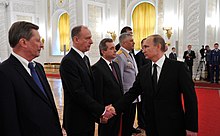
After the 2014 annexation of Crimea by the Russian Federation, Patrushev was placed on the European Union's list of sanctioned individuals in Russia.[73]
Patrushev was personally sanctioned by the UK government in 2014 in relation to Russo-Ukrainian War. [74]
In April 2018, the United States imposed sanctions on him and 23 other Russian nationals.[75][76]
Following the 2022 Russian invasion of Ukraine, the United States imposed sanctions against Andrey Patrushev, son of Nikolai Patrushev.[77]
Sanctioned by New Zealand in relation to the 2022 Russian invasion of Ukraine.[78]
Political views
[edit]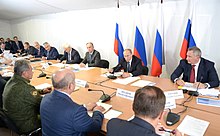


Patrushev belongs to the siloviki of Putin's inner circle.[79][a] Mark Galeotti, an expert in the field of Russian politics and security, said that Patrushev, one of Putin's closest advisers, is the "most dangerous man in Russia" because of his "paranoid conspiracy-driven mindset."[56][80] For his ability to control information reaching Putin, Galeotti compared him to Sir Humphrey from the British television series Yes Minister.[3] According to Andrey Kolesnikov of the Carnegie Endowment for International Peace, Patrushev speaks for Putin and is "allowed to explain and clarify Putin's thoughts."[55]
In December 2000, on the anniversary of the founding of the Bolshevik secret police, the Cheka, an interview with him was published in a Russian national daily. In defence of the emerging trend of co-opting officers in the security and intelligence apparatus into high government posts, Patrushev noted that his FSB colleagues did not "work for money [...] [they] are, if you will, modern 'neo-nobility'." ("современные «неодворяне»")[81][82] The term "new nobility" gained currency afterwards, as in the eponymous book The New Nobility.[83][84]
Ben Noble, Associate Professor of Russian Politics at University College London, describes Patrushev as "the most hawkish hawk, thinking the West has been out to get Russia for years".[85] He was quoted as saying, "The Americans believe that we control [our natural resources] illegally and undeservedly because, in their view, we do not use them as they ought to be used."[20] Patrushev has referenced "Madeleine Albright's claim 'that neither the Far East nor Siberia belong to Russia.'" According to the New York Times, this remark can be traced back to a psychic employed by the FSB who claimed to have read the thoughts in Albright's mind while in a state of trance.[86][87] In June 2020, he said that a "shameful page in history for all NATO countries was and will forever remain the barbaric" NATO bombing of Yugoslavia in 1999.[55]
Patrushev believes in various conspiracy theories and often gives interviews to state-controlled media in Russia.[56] In April 2022, he said that Washington "tried to force Russia to give up sovereignty, self-consciousness, culture, an independent foreign and domestic policy."[55] He claimed that the West is seeking to reduce "the world's population in various ways," including creating "an empire of lies, involving the humiliation and destruction of Russia and other objectionable states."[56] In June 2022, he accused the United States, Britain, the EU and Japan of an "increasingly adventurous and aggressive policy" that "is based on a complete detachment from reality, the desire to construct their own imaginary world, which they will rule. Such an escape from reality is a real threat to all of humanity."[55] In his interview in an official government paper Rossiyskaya Gazeta, he said that the Russo-Ukrainian War is only part of a wider war with NATO and the "collective West".[3] He warned that Russia "has modern, unique weapons capable of destroying any adversary, including the United States, in the event of a threat to its existence."[3]
According to Russian expert at the Carnegie Center, Alexander Sorkin, Patrushev and FSB director Alexander Bortnikov were formed by the Cold War between the United States and the Soviet Union and "believe that a bloc confrontation with the West is a reasonable and correct world order. And in order to return to a predictable and manageable confrontation, it is necessary to divide the zones of influence through war, even with the risk of a clash with NATO. According to Patrushev and Bortnikov, Ukraine should be in the Russian zone of influence".[50]
Personal life
[edit]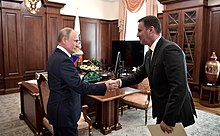
His eldest son, Dmitry, is a banker and the deputy prime minister for Agriculture since 2024, he previously served as Minister of Agriculture of Russia from May 2018 until 2024.[88][89] His younger son, Andrey, graduated in 2003 from the FSB Academy where he studied law with his classmate Pavel Fradkov, who is the son of Mikhail Fradkov, and has worked in leadership roles at Gazprom Neft.[90][91][92]
In January 2007, Nikolai Patrushev and his brother, Viktor Platonovich Patrushev (Russian: Виктор Платонович Патрушев), joined the expedition of polar explorer Arthur Chilingarov, that flew on two helicopters to Antarctica and visited the South Pole and the Amundsen-Scott station.[93][94]
Honours and awards
[edit]- Hero of the Russian Federation (2000)[95]
- Order of St Dmitri Donskoy, the Blessed Great Prince of Moscow, 1st Class (Russian Orthodox Church, 2005) – The saint allegedly wards off "all kinds of threats for the sake of multiplying the faith and piety of the people, strengthening families and protecting from bodily extinction and spiritual death."[96]
See also
[edit]Notes
[edit]- ^ Other siloviki close to Patrushev include Igor Sechin, Alexander Bortnikov, and Viktor Ivanov.[79]
References
[edit]- ^ "Ukraine conflict: Who's in Putin's inner circle and running the war?". BBC News. 2 March 2022. Retrieved 4 March 2022.
- ^ Troianovski, Anton (30 January 2022). "The Hard-Line Russian Advisers Who Have Putin's Ear". The New York Times. Retrieved 28 March 2022.
- ^ a b c d e f Galeotti, Mark (28 March 2023). "Nikolai Patrushev, the man dripping poison into Putin's ear". The Spectator.
- ^ a b "Патрушев Николай Платонович".
- ^ Владимир Прибыловский. Патрушев Николай Платонович Archived 2018-12-04 at the Wayback Machine. — Антикомпромат
- ^ Патрушев Николай Платонович Archived 2016-09-28 at the Wayback Machine. — Официальный сайт ФСБ РФ (www.fsb.ru)
- ^ BackGround, People: PATRUSHEV, Nikolai Platonovich, Russia Profile, Moscow, Undated Archived 7 March 2013 at the Wayback Machine.Retrieved: 8 January 2013.
- ^ "Twelve Who Have Putin's Ear". Radio Free Europe/Radio Liberty (RFE/RL). 15 October 2007.
- ^ "Биография :: Федеральная Служба Безопасности". www.fsb.ru. Retrieved 2 November 2022.
- ^ "How Russia's secret service took control of the country's top office". ABC. 20 November 2023.
- ^ "September 1999 Russian apartment bombings timeline - Blog - The Fifth Estate". CBC. 8 January 2015. Archived from the original on 15 September 2020. Retrieved 2 July 2020.
- ^ Goldfarb, Alexander; Litvinenko, Marina (2007), Death of a Dissident, Simon & Schuster, pp. 190, 196, ISBN 978-1-4165-5165-2
- ^ Amy Knight (22 November 2012). "Finally, We Know About the Moscow Bombings". The New York Review of Books. Archived from the original on 7 December 2021. Retrieved 5 April 2017.
The evidence provided in The Moscow Bombings makes it abundantly clear that the FSB of the Russian Republic, headed by Patrushev, was responsible for carrying out the attacks.
- ^ "Russian bomb scare turns out to be anti-terror drill". CNN. 24 September 1999. Archived from the original on 20 August 2019. Retrieved 20 August 2019.
- ^ Tyler, Patrick E. (1 February 2002). "Russian Says Kremlin Faked 'Terror Attacks'". The New York Times. Archived from the original on 7 March 2022. Retrieved 29 January 2012.
- ^ Amy Knight (22 November 2012). "Finally, We Know About the Moscow Bombings". The New York Review of Books. Archived from the original on 7 December 2021. Retrieved 5 April 2017.
The evidence provided in The Moscow Bombings makes it abundantly clear that the FSB of the Russian Republic, headed by Patrushev, was responsible for carrying out the attacks.
- ^ The Litvinenko Inquiry. Report into the death of Alexander Litvinenko, January 2016, p. 241–244.
- ^ BackGround, People: PATRUSHEV, Nikolai Platonovich, Russia Profile, Moscow, Undated Archived 7 March 2013 at the Wayback Machine.Retrieved: 8 January 2013.
- ^ Russia trolls world by saying it cannot stop its citizens from fighting in Ukraine, Kyiv Post (25 June 2015)
- ^ a b c Patrushev, Nikolai; Kommersant, Elena Chernenko for (15 July 2015). "Terrorism, Ukraine and the American threat: the view from Russia". the Guardian. Retrieved 17 July 2015.
- ^ Amos, Howard (21 June 2017). "Vladimir Putin's man in the Balkans: The involvement of Nikolai Patrushev, a former spy and Putin confidante, indicates a more hardline Russian approach to the region". Politico.
- ^ Mark Galeotti (4 April 2018). "Do the Western Balkans face a coming Russian storm?". European Council on Foreign Relations.
- ^ "Russia's Comeback in the Balkans - New Eastern Europe". New Eastern Europe. 13 August 2018.
- ^ Burrows, Emma (1 March 2018). "Russian model in Thai jail promises to spill Trump-Russia secrets". CNN. Retrieved 11 February 2020.
- ^ Kalmbacher, Colin (22 January 2019). "Model Who Claimed to Have Dirt on Paul Manafort-Linked Russian Billionaire Just Got Out of Jail". lawandcrime.com. Retrieved 22 January 2019.
- ^ Hunter, Brad (27 January 2019). "A sex guru, party girls, oligarchs, Putin and Trump". Toronto Sun. Retrieved 5 February 2020.
- ^ "Russia Says U.S.-Iran 'War' Possible, But 'We Will Convince' Them to Talk". Newsweek. 26 June 2019.
- ^ "Vladimir Putin: The security men, officials, and friends who are in Russian president's inner circle". Sky News. 28 February 2022.
- ^ "Russia's security strategy envisages 'forceful methods'". ABC News. 31 May 2021.
- ^ "Putin's inner circle: Who has the Russian president's ear on the war in Ukraine?". Deutsche Welle. 11 March 2022.
- ^ "Russia Seeks Closer Security Ties With China as Key Goal". The Diplomat. 19 September 2022.
- ^ "China and Russia want fair world order, won't bend to 'external factors', Russian security chief says". South China Morning Post. 19 September 2022.
- ^ "Russia's security chief discusses Ukraine, trade on visit to Iran". Al Jazeera. 9 November 2022.
- ^ "Vietnam and Russia, Belarus strengthen cooperation on security". Ministry of Public Security. 25 November 2022.
- ^ "FM Shoukry reiterates calls for political solution to Russian-Ukrainian crisis". Al-Ahram. 31 January 2023.
- ^ a b "Kremlin official urges deeper ties with China to resist West". AP News. 21 February 2023.
- ^ "Top Putin ally visits Cuba, meets president and Raul Castro - Tass". Swissinfo. Reuters. 2 March 2023.
- ^ "Putin ally meets India's Modi in New Delhi". Reuters. 29 March 2023.
- ^ "Kremlin says Russia and China must edge closer to counter Western efforts to contain them". AP News. 19 September 2023.
- ^ "Top Putin ally pledges Russian help in countering U.S. in Latin America - TASS". Reuters. 27 February 2024.
- ^ Kovačević, Filip (10 March 2022). "The Second Most Powerful Man In Russia". New Lines Magazine. Retrieved 8 December 2023.
- ^ "After Putin: 12 people ready to ruin Russia next". POLITICO. 29 September 2022. Retrieved 2 October 2022.
- ^ Weiss, Michael (August 2023). "The Death of Yevgeny Prigozhin: A Foreign Office Special Episode". Foreign Office with Michael Weiss.
- ^ Reporter, Isabel van Brugen (2 November 2023). "Who is Nikolai Patrushev? Putin loyalist touted as his successor". Newsweek. Retrieved 4 December 2023.
- ^ "Senior Russian security official questions U.S. commitment to Ukraine after Afghan exit". Reuters. 19 August 2021.
- ^ "What Russia Got Wrong". Foreign Affairs. 8 February 2023.
- ^ Schwirtz, Michael; Troianovski, Anton; Al-Hlou, Yousur; Froliak, Masha; Entous, Adam; Gibbons-Neff, Thomas (17 December 2022). "Putin's War: The Inside Story of a Catastrophe". The New York Times. Archived from the original on 17 December 2022.
- ^ Parfitt, Tom; Brown, Larissa (30 January 2022). "Even Ukraine doesn't believe the West's claim that war is coming, says Russia". The Times. Archived from the original on 17 February 2022.
- ^ "U.S. and U.K. Work on Russian Sanctions Revamp: Ukraine Update". Bloomberg. 30 January 2022.
- ^ a b "A look at the trio who convinced Putin to invade". Yahoo News. 9 January 2023.
- ^ "Kremlin Insiders Alarmed Over Growing Toll of Putin's War in Ukraine". Bloomberg. 20 March 2022.
- ^ Isikoff, Michael (27 February 2022). "Putin may have 'lost touch with reality,' expert says". Yahoo! News. Retrieved 27 February 2022.
- ^ "How Putin blundered into Ukraine — then doubled down". Financial Times. 23 February 2023.
- ^ "Putin ally says Ukraine heading for collapse into several states". Reuters. 26 April 2022.
- ^ a b c d e f g h i j k "The World According to Patrushev". Russia Matters. Harvard Kennedy School's Belfer Center for Science and International Affairs. 7 October 2022.
- ^ a b c d "As one of Vladimir Putin's closest advisers on Ukraine, Nicolai Patrushev spreads disinformation and outlandish conspiracy theories". The Conversation. 7 June 2022.
- ^ "NSA Ajit Doval meets Patrushev in Moscow to discuss steps to boost strategic ties". The Economic Times. 18 August 2022.
- ^ "Russia: West stepping up efforts to destabilize other countries". Anadolu Agency. 3 November 2022.
- ^ "Russia is now fighting NATO in Ukraine, top Putin ally says". Reuters. 10 January 2023.
- ^ "Putin ally accuses U.S. of involvement in deadly attacks inside Russia". Reuters. 19 May 2023.
- ^ "Russia has 'neutralised' hundreds of foreign intelligence agents, top security official says". Reuters. 15 September 2023.
- ^ "China top diplomat heads to Russia for 4-day talks". Deutsche Welle. 18 September 2023.
- ^ "Russia's top security official visits Azerbaijan, meets president". Reuters. 10 October 2023.
- ^ "Prigozhin Killing Ordered by Putin's Security Council Chief – WSJ". The Moscow Times. 22 December 2023.
- ^ "Prigozhin Killing Ordered by Putin's Security Council Chief – WSJ". The Moscow Times. 22 December 2023.
- ^ "Moscow attack: Putin blames 'radical Islamists' but accuses Ukraine too". BBC. 26 March 2024. Archived from the original on 26 March 2024.
- ^ "Russian defence minister and long-time Putin ally Sergei Shoigu to be replaced".
- ^ "Putin Appoints Ex-Security Chief as Presidential Aide". The Moscow Times. 14 May 2024.
- ^ "Kremlin accuses the West of helping Ukraine attack Russia". SWI swissinfo. 16 August 2024.
- ^ "Russia claims Western intelligence services orchestrated Ukrainian troops' incursion into Kursk". Anadolu Agency. 16 August 2024.
- ^ a b "Putin to keep demoted ally Patrushev on Russia's Security Council". Reuters. 12 June 2024.
- ^ a b "Putin retires top 'hawk' over unrealistic strategies". The New Voice of Ukraine. 12 June 2024.
- ^ "COUNCIL IMPLEMENTING REGULATION (EU) No 810/2014 of 25 July 2014 implementing Regulation (EU) No 269/2014 concerning restrictive measures in respect of actions undermining or threatening the territorial integrity, sovereignty and independence of Ukraine". eur-lex.europa.eu. 25 July 2014. Retrieved 29 August 2016.
- ^ "CONSOLIDATED LIST OF FINANCIAL SANCTIONS TARGETS IN THE UK" (PDF). Retrieved 16 April 2023.
- ^ "Ukraine-/Russia-related Designations and Identification Update". United States Department of the Treasury. 6 April 2018. Retrieved 6 April 2018.
- ^ США ввели санкции против семи российских олигархов и 17 чиновников из «кремлевского списка» [The US imposed sanctions against seven Russian oligarchs and 17 officials from the "Kremlin list"]. Meduza (in Russian). 6 April 2018. Retrieved 6 April 2018.
- ^ US Department of the Treasury's Office of Foreign Assets Control (OFAC). "Russia-related Designations; Belarus Designations; Issuance of Russia-related Directive 2 and 3; Issuance of Russia-related and Belarus General Licenses; Publication of new and updated Frequently Asked Questions". U.S. Department of the Treasury. Retrieved 1 March 2022.
- ^ "Russia Sanctions Regulations 2022". Retrieved 11 February 2023.
- ^ a b Harding, Luke (21 December 2007). "Putin, the Kremlin power struggle and the $40bn fortune". The Guardian. Retrieved 11 February 2020.
- ^ Galeotti, Mark (14 June 2020). "In Moscow's Shadows". Buzzsprout.
- ^ Russia's New Nobility – The Rise of the Security Services in Putin's Kremlin, Andrei Soldatov and Irina Borogan (of Agentura.ru), Foreign Affairs, September/October 2010 and in the authors' The New Nobility – The Restoration of Russia's Security State and the Enduring Legacy of the KGB, Public Affairs, New York, September 2010.Retrieved: 8 March 2013.
- ^ Интервью с Директором Федеральной службы безопасности России Н.Патрушевым Komsomolskaya Pravda, 20 December 2000.
- ^ В России уже почти 15 тысяч «новых дворян»: Ксения Собчак, Алексий II, Николай Патрушев NEWSru.com 6 November 2007.
- ^ "The New Nobility". www.goodreads.com. Retrieved 9 December 2018.
- ^ Kirby, Paul (3 March 2022). "Ukraine conflict: Who's in Putin's inner circle and running the war?". BBC News. Retrieved 3 March 2022.
- ^ Mackey, Robert (18 December 2014). "Putin Cites Claim About U.S. Designs on Siberia Traced to Russian Mind Readers". The New York Times. ISSN 0362-4331. Retrieved 17 July 2015.
- ^ Moscow, Oleg Kashin in (15 July 2015). "How hallucinations of eccentric KGB psychic influence Russian policy". the Guardian. Retrieved 17 July 2015.
- ^ "The President signed executive orders appointing members of the Russian Federation Government and heads of federal services". President of Russia. 14 May 2024. Archived from the original on 15 May 2024. Retrieved 15 May 2024.
- ^ Гордеев, Владислав (Gordeev, Vladislav); Сухорукова, Елена (Sukhorukova, Elena); Новопашина, Наталья (Novopashina, Natalia) (18 March 2018). "Дмитрий Патрушев возглавил Минсельхоз: Глава Россельхозбанка Дмитрий Патрушев возглавит Министерство сельского хозяйства в новом правительстве России. Его кандидатуру представил президенту Владимиру Путину премьер Дмитрий Медведев" [Dmitry Patrushev headed the Ministry of Agriculture: The head of Rosselkhozbank, Dmitry Patrushev, will head the Ministry of Agriculture in the new Russian government. Prime Minister Dmitry Medvedev presented his candidacy to President Vladimir Putin.]. RBK (in Russian). Archived from the original on 3 August 2021. Retrieved 19 May 2018.
{{cite news}}: CS1 maint: multiple names: authors list (link) - ^ "Here are the Russian oligarchs targeted in Biden's sanctions". NBC News. 26 February 2022. Retrieved 12 March 2022.
- ^ Джорджевич, Александра (Djordjevic, Alexandra); Прокушев, Владимир (Prokushev, Vladimir) (17 November 2020). "Наследные принципы: Как российская элита передает страну в руки своих детей" [Legacy principles: How the Russian elite is handing the country over to their children]. Novaya Gazeta #127 November 18, 2020 (in Russian). Retrieved 26 March 2022.
{{cite news}}: CS1 maint: multiple names: authors list (link) - ^ Бондаренко, Мария (Bondarenko, Maria); Подобедова, Людмила (Podobedova, Lyudmila) (6 April 2015). "Сын Патрушева,однокурсник Фрадкова: В «Газпром нефти» новый начальник" [Patrushev's son, Fradkov's classmate: Gazprom Neft has a new boss]. RBC (in Russian). Archived from the original on 28 November 2018. Retrieved 26 March 2022.
{{cite news}}: CS1 maint: multiple names: authors list (link) - ^ "Победит ли Россия в "информационной войне" с Эстонией?: "Подвиг их неизвестен"" [Will Russia win the "information war" with Estonia?: "Their feat is unknown"]. BBC (in Russian). 3 May 2007. Retrieved 11 February 2020.
- ^ Николаева, Анна (Nikolayeva, Anna) (3 May 2007). "Подвиг их неизвестен: Президент наградил родственников директора ФСБ" [Their feat is unknown: President awarded relatives to FSB director]. FLB (Freelance Bureau) (in Russian). Retrieved 11 February 2020 – via Vedomosti.
{{cite news}}: CS1 maint: multiple names: authors list (link) - ^ Герои страны
- ^ Dmitri Donskoy, the Blessed Great Prince of Moscow, Icons of the 21st Century, Moscow, Undated. Retrieved: 8 March 2013.
External links
[edit]- FSB biography (in Russian)
- Security Council Biography (in Russian)
- Patrushev Biography in English